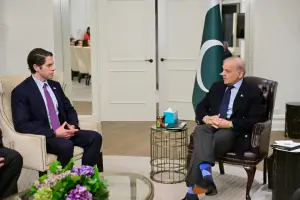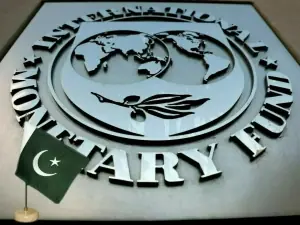PM Imran should avoid political remarks about top court judges: Justice Mandokhail
5 min readAs the hearing of the presidential reference resumed on Monday, Justice Jamal Mandokhail referred to Prime Minister Imran Khan’s address during a public gathering, saying that the premier should avoid political remarks that included the judiciary.
Justice Mandokhail gave these remarks during hearing of the presidential reference seeking the top court’s interpretation of Article 63-A of the Constitution and the Supreme Court Bar Association’s petition for peaceful execution of the no-trust motion against Prime Minister Imran Khan.
A five-member bench of the apex court headed by Chief Justice of Pakistan Justice Umar Ata Bandial and comprising Justice Ijaz ul Ahsan, Justice Mazhar Alam Miankhel, Justice Munib Akhtar and Justice Jamal Mandokhail heard the case.
The prime minister, while addressing a public rally in Kamalia on Saturday, had accused former prime minister Nawaz Sharif of giving “briefcases [full of money] to judges to bribe them... He gave Lahore Development Authority (LDA) plots to judges. Now, he will attack the judiciary. He is already sowing discord in the Supreme Court by getting judges to side with him. He will never allow an independent judiciary because he wants to get his [corruption] cases cleared."
Referring to the prime minister’s address, Justice Miankhel inquired whether such “political statements” need to be made and asked Advocate General of Pakistan Khalid Javed Khan about the impact of the remarks on judicial proceedings. He added that the premier’s address was broadcast on national TV and he should avoid such political statements.
The AGP said the court should not concentrate on the affairs going on outside the court.
When AGP Khan was asked to complete his arguments in the presidential reference, he said it was impossible to do it during today's (Monday) hearing.
In his arguments related to the attack on Sindh House in Islamabad, Khan said the provincial government's viewpoint about the attack was not included in the case.
At this the CJP remarked that the apex court held an “unusual hearing” on the incident and asked the AGP to consult the concerned forum. He added that as per the Sindh government’s perspective, this attack was “terrorism”, while the Islamabad advocate general told the Supreme Court that clauses related to terrorism were not included in the case.
The federal government included “childish clauses” in the first information report under which the accused could get bail, remarked the CJP. He ordered the federal government to continue proceedings of the case as per law and asked the administration to submit a comprehensive report on the issue tomorrow (Tuesday).
CJP Bandial remarked that if the court concentrated on the issue of the FIR, it would take three days to continue the hearing.
With the focus of hearing shifted to the presidential reference, Justice Mandokhail inquired the AGP about the consequences in case a lawmaker resigns from his post.
The attorney general responded that the real issue was that the disgruntled members of the ruling party were not submitting their resignation.
At this Justice Mandokhail remarked that the court should not be involved in political conflicts while asking AGP to leave political matters aside and talk about interpretation of the Constitution’s article.
AGP Khan said he was assisting the court in the matter and not confusing the Supreme Court.
If a lawmaker resigns from the membership of the National Assembly, he will be de-seated, the court remarked.
In his remarks, the AGP gave reference to a Supreme Court verdict issued in 2018 wherein the apex court ordered the candidates applying for elections to submit an affidavit along with the nomination papers for the purpose of transparency in the electoral process which were not included in the law. But it was submitted on the orders of the apex court as the documents were considered incomplete without the affidavit, he added.
Justice Mandokhail inquired whether the AGP considered that Article 63-A of the Constitution lacked anything.
At this AGP Khan said the Article 63-A could not be read alone as in the earlier verdict a larger bench of the court gave reference to Article 62 and 63 to ensure the process was transparent.
At this Justice Ahsan remarked that Article 63-A talked about de-seating of lawmakers and how could the AGP combine de-seating of a lawmaker with his permanent disqualification. He added that if a lawmaker switches loyalties, multiple forums existed to address the issue. However, combining the two articles, Article 63-A and Article 62 (1) (f), was mere assumption.
He further inquired how the two articles could be combined, adding whether bribery — taken by the lawmakers to vote against the prime minister — was not mandated to be proved on any forum.
Justice Ahsan added if it is proved that a lawmaker took a bribe, Article 62 (1) (f) could be applied.
AGP Khan continued when a lawmaker violated Article 63-A of the Constitution, it would come under “dishonesty” and this would lead to the application of the Article 62 (1) (f).
When asked who would be on the receiving end, if a disgruntled lawmaker was breaking trust, AGP Khan said the initial “dishonesty” would be with the people of the constituency as public could not back out from their votes after casting them once.
Justice Ahsan remarked violating the party policy was itself ambiguous.
In his remarks, CJP Bandial noted the lawmakers who were violating political party’s policy would had to bear the brunt. He remarked that the federal government wanted the apex court to specify the duration of disqualification related to the Article 63-A in which de-seating of a lawmakers was mentioned.
He added that a court decision was necessary for the application of Article 62 (1) (f) as in the Article 63-A the duration of disqualification was from two to five years.
Later, the apex court adjourned hearing of the case.
In the earlier version of this story, it was mentioned that the Supreme Court ordered the federal government to arrest the people involved in the attack on Sindh House in Islamabad. The court has sought a report on the issue while instructing the authorities to follow the law in that case. The error is regretted.
For the latest news, follow us on Twitter @Aaj_Urdu. We are also on Facebook, Instagram and YouTube.
























Comments are closed on this story.